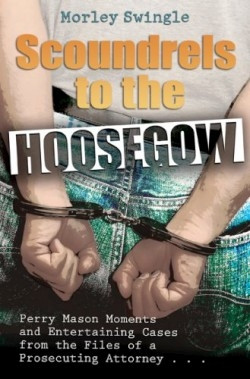Scoundrels to the Hoosegow
Perry Mason Moments and Entertaining Cases from the Files of a Prosecuting Attorney
“If there were no bad people there would be no good lawyers.” That was just as true when Charles Dickens first made this observation as it is today. There are plenty of bad people chronicled in Scoundrels to the Hoosegow, and several good lawyers and police officers appear as well. The bad guys end up in the hoosegow (an Old West slang term for jail), where they belong. The stories behind their incarceration and prosecution for various crimes, from the petty to the horrendous, make fascinating reading.
Perry Mason was a fictional criminal defense lawyer who seemed to win every case in the series which ran on television in the fifties and sixties. Most episodes were characterized by Mason’s scintillating cross-examination of a prosecution witness who would often break down on the witness stand and confess to the crime, thereby exculpating Mason’s wrongly accused client. In real life, of course, such events are rare, but every trial attorney eventually has one: that climatic “Perry Mason moment” when the lawyer has done something fantastic and everyone in the courtroom knows it. As Swingle puts it, these instances are characterized by a stunning admission or a brilliant question which “has just left the opposing counsel reeling, his mouth agape, and the jurors amazed and entertained. The case is won, and the rest of the trial is a formality.”
Swingle has tried more than 150 cases in his twenty years as a prosecutor in Cape Girardeau, Missouri. He has collected his favorite “war stories” into this marvelous compendium of bad guys, good guys, and nearly everyone in between. He recounts tales as diverse as “The Case of the Embarrassing Defense,” where the defendant claimed his “equipment” was too small to be seen by the victim to whom he exposed himself; to his prosecution of a brutal, recalcitrant killer in a death penalty case, “The Case of the Homicidal Energy Bunny.” One of his favorite stories, “The Case of the Forgetful Drunk,” involves a sports fan who got so inebriated that he forgot his wife and two friends at the game when he left the ball park. Needless to say, his arrest for drunk driving swiftly followed, but the punishment he received from the State of Missouri may have paled in comparison to that meted out by his irate wife.
The author is a terrific writer and an even better entertainer, able to create interest in such simple matters as why police officers wear their badges on their left sides. He is often humorous, such as when he recounts the poor marksmanship of several police officers he knows well in “The Case of the Perforated Patrol Car,” and he is always introspective. To complement the cases he recounts, he liberally intersperses pithy quotations from legal scholars, philosophers and even humorists including his favorite author, Mark Twain. They often provide clever insight into his many vignettes, such as Twain’s notable observation which begins “The Case of the Lead-Footed Physician”: “It’s better to keep your mouth shut and appear stupid than to open it and remove all doubt.” Sage advice for attorneys and their clients alike.
Having prosecuted thousands of cases and taught numerous seminars around the country, Swingle has enormous experience and is the epitome of a good prosecutor. While involved with some high-profile cases, he has faced down threats to his independence from sources as diverse as religious organizations to the ACLU. “Threatening to sue me in an attempt to dissuade me from doing my job was like threatening to throw a pig in mud,” he writes, and that integrity comes across throughout this book. Some of the cases he has prosecuted have been featured on the Oprah Winfrey Show, Dateline, and Court TV. He has also authored a novel, The Gold of Cape Girardeau.
From “The Case of the Stone-Dead Blood Stone Villain,” where he found himself on the wrong side of a Perry Mason moment caused by one of his own witnesses, to his being featured as a defender of free speech by a pornography magazine in “The Case of the Titillating Tape,” this author has seen it all. Lawyers and non-lawyers alike will enjoy being along for this informative and entertaining trip to the hoosegow.
Disclosure: This article is not an endorsement, but a review. The publisher of this book provided free copies of the book to have their book reviewed by a professional reviewer. No fee was paid by the publisher for this review. Foreword Reviews only recommends books that we love. Foreword Magazine, Inc. is disclosing this in accordance with the Federal Trade Commission’s 16 CFR, Part 255.

